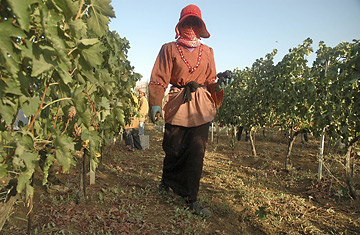
The Massaya vineyard in Lebanon's Bekaa Valley.
The slow end to a sizzling summer along the shores of the eastern Mediterranean has brought harvest season to the Bekaa Valley. The fertile basin just over Lebanon's coastal mountain range may be well known as a hotbed of Shi'ite militancy that has at various times hosted some of the world's most notorious terrorists, but it is also home to Lebanon's wine industry. It's a very Lebanese experience to watch Bedouin farm workers in the early morning light that illuminates distant mosques, as they carry crateloads of grapes to be pressed into a liquid that Islamic law forbids them, and most of their neighbors, from consuming.
Alcohol production might seem incongruous in the overwhelmingly Muslim Middle East, but viniculture is an integral part of Lebanese culture — and not just because of the country's large Christian minority. Wine-making began in this part of the world thousands of years ago, and such was the importance of the Bekaa to the global wine industry of classical antiquity that the Romans built a massive temple in Baalbek to the wine god Bacchus, which still stands today. In fact, it was Arabs who invented the art of distilling fermented beverages into alcoholic spirits, and then exported it during the Islamic conquests of the Middle Ages. They practice it still by making arak, a grape-based anise-flavored drink. Today, the majority owners of Lebanon's two largest wineries are, respectively, Druze and Sunni Muslims. The workforce that picks the grapes, and the landowners who grow them are almost all Muslims. And only God knows how many of Lebanon's wine drinkers are also Muslims."The whole existence of wine-making is a contradiction to most of the preconceived notions people have Lebanon," said Ramzi Ghosn, who along with his older brother Sami founded Massaya, one of Lebanon's newer wine-makers, near the Bekaa town of Chtaura. The Ghosn brothers are part of the generation that left Lebanon during the country's brutal 15-year civil war, and who began returning in the 1990s to rebuild the country with skills they learned abroad. For Ramzi, who studied marketing in the United States, wine is a perfect vehicle for changing the perception that Lebanon is haven for religious fanaticism and terrorism. "Wine is a message of tolerance and sophistication."
Admittedly, Lebanon — which makes about 6 million bottles of wine a year — is one of the world's smallest producers. But its wines are smooth and tasty, and a few of the country's dozen or so commercial labels are internationally renowned. For a recent dinner of frogs legs, thick yogurt, and sauted liver, Ramzi invited a TIME correspondent to drink a Massaya classic red, not one of his fanciest, but one that best reflects the region, with a peppery taste and smells of mint and thyme. The humble cinsualt grape he uses doesn't have a strong personality of its own, but absorbs the surrounding environment like a sponge. Much like Lebanon itself.
Perhaps it was the bottle of red, or the ros, or the arak, or the starry Bekaa night, but suddenly it all started to make sense: We were drinking for Lebanon. The Lebanese economy is now hugely dependent on aid from foreign powers — who have turned the country into a regional battleground — and also on the foreign tourism that has turned Beirut into an Oriental Disneyland for the privileged few. But if foreigners start quaffing Lebanese wine en masse, Bekaa valley vineyards could become incubators for economic independence and environmental sustainability: In vino, libertas. Come to think of it, Israel produces wine too. Can we drink our way to Middle East peace?
Unfortunately, Lebanon's recent troubles cloud the outlook for the wine industry. This year, impoverished Bekaa farmers took advantage of the security forces' being distracted by the protracted battle against Islamist radicals holed up in a Palestinian refugee camp, to plant another of the Bekaa's fabled crops: hashish. Hashish farming threatens to gobble up land that could be used for vineyards, and creates a get-rich-quick gangster culture that's at odds with the patient investment necessary to produce wine.
Following last summer's war with Israel, an ongoing political crisis, and a string of assassinations, Lebanon's reputation hangs in the balance. "Wine develops as long as the country where it is produced conveys positive values," Ramzi explained. No one wanted to drink South African wine during apartheid, and Chile couldn't sell its wine as long as Pinochet was in power. "Wine is a journey," he said. "And who want to travel to a country that conveys negative values?"
